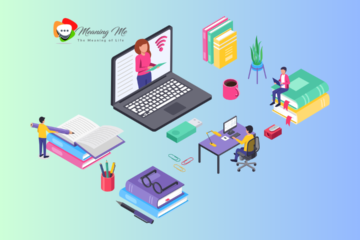Introduction
In today’s rapidly evolving global landscape, the concept of education has transcended traditional boundaries, embracing a paradigm shift towards lifelong learning and continuous skill development. Online education, propelled by advancements in technology and the increasing demand for flexible learning options, plays a pivotal role in facilitating this transformation. This article explores how online education serves as a catalyst for lifelong learning, empowering individuals to acquire new knowledge, develop essential skills, and adapt to emerging trends and challenges throughout their lives.

Online education has democratized access to learning opportunities, breaking down geographical barriers and offering flexible learning pathways that cater to diverse learner needs. Learners can access a vast array of courses, programs, and resources from reputable institutions and experts around the world, regardless of their location or schedule constraints. This accessibility is particularly beneficial for working professionals seeking to upgrade their skills, stay abreast of industry developments, or pursue career transitions without disrupting their professional commitments.
Furthermore, online education fosters a culture of continuous skill development by providing personalized learning experiences tailored to individual learning preferences and career aspirations. Adaptive learning technologies and personalized learning platforms use data-driven insights to customize learning pathways, pacing, and content delivery, optimizing learning outcomes and engagement. Learners have the flexibility to choose from a variety of formats, including self-paced courses, interactive modules, and live sessions, enabling them to acquire knowledge and skills at their own convenience and pace.
Moreover, online education equips learners with the critical skills necessary to thrive in the digital age. Rapid technological advancements and economic shifts demand a workforce proficient in digital literacy, problem-solving, collaboration, and adaptability. Online courses often integrate cutting-edge technologies, simulations, and hands-on exercises that simulate real-world scenarios, enabling learners to apply theoretical knowledge and develop practical skills relevant to their professions.
Beyond technical skills, online education promotes soft skills such as communication, critical thinking, and leadership, which are essential for professional success and personal growth. Virtual collaboration tools, group projects, and peer-to-peer interactions facilitate skill development in teamwork, communication, and cultural competency, preparing learners to navigate diverse workplace environments and global markets effectively.
Accessibility and Flexibility of Online Learning
Online learning has revolutionized education by offering unprecedented accessibility and flexibility to learners worldwide. Unlike traditional classroom-based education, online learning removes geographical barriers and time constraints, allowing individuals to access educational resources and programs from virtually anywhere and at any time.
One of the primary benefits of online learning is its accessibility. Learners no longer need to reside near educational institutions or relocate to pursue higher education or skill development. Online courses and programs are accessible to anyone with an internet connection, democratizing education and expanding learning opportunities to individuals in remote or underserved regions. This accessibility is particularly advantageous for individuals with disabilities, who may find it challenging to access traditional educational settings but can thrive in online environments tailored to accommodate diverse learning needs.
Furthermore, online learning offers unparalleled flexibility in scheduling and pacing. Learners have the freedom to choose when and how they engage with course materials, allowing them to balance their studies with work, family responsibilities, and personal commitments. Self-paced courses and asynchronous learning modules enable learners to progress through content at their own speed, accommodating different learning styles and preferences for optimal comprehension and retention.

Moreover, online learning provides flexibility in course selection and specialization. Learners can choose from a wide range of disciplines, programs, and certification courses offered by universities, colleges, and online platforms. This diversity of options allows individuals to pursue educational pathways aligned with their career goals, interests, and professional development needs without the constraints of traditional academic calendars or geographical limitations.
The flexibility of online learning extends beyond scheduling to include diverse learning modalities and formats. Online courses often incorporate multimedia resources, interactive simulations, virtual labs, and collaborative tools that enhance engagement and facilitate active learning. These innovative approaches cater to diverse learning styles and preferences, providing learners with dynamic and immersive educational experiences that foster skill development and knowledge acquisition.
Personalized Learning Experiences
Personalized learning in online education refers to tailored educational experiences that cater to individual learning preferences, interests, and abilities. Unlike traditional one-size-fits-all approaches, personalized learning leverages technology and data-driven insights to customize learning pathways, content delivery, and instructional strategies, empowering learners to achieve their academic and professional goals more effectively.
One of the key components of personalized learning is adaptive learning technologies. These technologies use algorithms and artificial intelligence to analyze learner data, including performance metrics, learning styles, and knowledge gaps. Based on this analysis, adaptive systems dynamically adjust course content, pacing, and instructional strategies to meet each learner’s specific needs and optimize learning outcomes. This adaptive approach ensures that learners receive targeted support and resources tailored to their unique strengths and areas for improvement, enhancing engagement and retention of material.
Furthermore, online platforms offer a variety of tools and features that support personalized learning experiences. Learners have access to self-assessment tools, diagnostic tests, and learning analytics dashboards that provide real-time feedback on their progress and performance. This feedback enables learners to monitor their learning trajectory, identify areas of strength and weakness, and make informed decisions about their study habits and academic goals.
Another aspect of personalized learning in online education is the flexibility to choose learning paths and resources that align with individual interests and career aspirations. Learners can select from a diverse range of courses, specializations, and micro-credentials offered by universities, educational institutions, and online learning platforms. This flexibility allows individuals to pursue interdisciplinary studies, explore emerging fields, or acquire specialized skills that are relevant to their professional development and personal interests.
Moreover, personalized learning promotes learner autonomy and self-directed learning. Online courses often feature interactive modules, multimedia resources, and collaborative tools that empower learners to explore topics at their own pace and delve deeper into areas of personal interest. This learner-centered approach fosters intrinsic motivation, critical thinking skills, and lifelong learning habits, preparing individuals to adapt to evolving career demands and lifelong learning opportunities.
Integration of Technological Advancements in Online Education
The integration of technological advancements has revolutionized online education, enhancing accessibility, engagement, and learning outcomes for students worldwide. From interactive learning platforms to immersive virtual reality experiences, technological innovations continue to shape and redefine the landscape of online education, offering new possibilities for personalized learning and collaborative learning environments.
One of the primary technological advancements driving online education is the development of interactive learning management systems (LMS) and educational platforms. These platforms combine multimedia resources, interactive modules, and social learning features to create dynamic and engaging learning experiences. Learners can access course materials, participate in discussions, collaborate on projects, and receive real-time feedback from instructors and peers, fostering active learning and knowledge retention.
Additionally, adaptive learning technologies play a crucial role in personalizing the learning experience in online education. Adaptive learning systems use algorithms and artificial intelligence to analyze learner data, including performance metrics and learning behaviors. Based on this analysis, the system dynamically adjusts course content, pacing, and instructional strategies to meet each learner’s unique needs and learning objectives. This adaptive approach enhances learner engagement, promotes mastery of content, and improves academic outcomes by providing targeted support and personalized learning pathways.
Furthermore, the integration of virtual reality (VR) and augmented reality (AR) technologies has transformed online education by creating immersive learning environments that simulate real-world scenarios and enhance experiential learning. VR and AR applications allow learners to explore complex concepts, conduct virtual experiments, and engage in interactive simulations that enhance understanding and retention of material. These technologies are particularly beneficial for disciplines such as healthcare, engineering, and architecture, where hands-on experience and spatial awareness are essential for skill development.
Moreover, mobile learning technologies have expanded access to education by enabling learners to access course materials and participate in learning activities from their smartphones, tablets, or other mobile devices. Mobile-friendly learning platforms and apps offer flexibility and convenience, allowing learners to study on the go and engage with educational content anytime, anywhere.

Development of Technical and Soft Skills
Online education plays a crucial role in the development of both technical and soft skills, equipping learners with competencies essential for professional success and personal growth in today’s global workforce. These skills encompass a broad spectrum of abilities, ranging from technical proficiencies in digital tools and platforms to interpersonal skills such as communication, collaboration, and critical thinking.
Firstly, online education facilitates the acquisition of technical skills by providing learners with hands-on experience and training in digital technologies and tools relevant to their fields of study. Virtual labs, simulations, and interactive modules allow students to practice using software applications, coding languages, data analytics tools, and other technical resources in a controlled, educational environment. This practical experience enhances technical proficiency, problem-solving abilities, and adaptability to technological advancements, preparing learners to meet the demands of digital-centric industries and professions.
Moreover, online courses often incorporate specialized training and certification programs that enable learners to acquire industry-specific technical skills and credentials. These programs are designed in collaboration with industry experts and organizations to align with current industry standards, practices, and emerging technologies. By completing these courses, learners gain specialized knowledge and competencies that enhance their professional qualifications and career prospects in competitive job markets.
In addition to technical skills, online education fosters the development of soft skills that are essential for effective communication, collaboration, and leadership in diverse professional settings. Virtual collaboration tools, discussion forums, and group projects encourage learners to communicate ideas, resolve conflicts, and work collaboratively with peers from different cultural backgrounds and perspectives. These experiences promote interpersonal skills, empathy, cultural competence, and teamwork, preparing learners to thrive in globalized work environments characterized by diversity and digital connectivity.
Furthermore, online education emphasizes critical thinking, problem-solving, and analytical skills through interactive assignments, case studies, and real-world applications. Learners are challenged to analyze complex information, evaluate evidence, and generate innovative solutions to practical problems, fostering a mindset of curiosity, creativity, and lifelong learning.
Promotion of Lifelong Learning Mindset
Online education plays a pivotal role in promoting a lifelong learning mindset by fostering continuous intellectual growth, skill development, and personal enrichment throughout individuals’ lives. This approach to learning encourages individuals to embrace curiosity, adaptability, and a proactive approach to acquiring knowledge and skills, regardless of age or career stage.
One of the primary ways online education promotes a lifelong learning mindset is through accessibility and flexibility. Online courses and programs offer convenient access to a diverse range of educational resources, allowing learners to pursue learning opportunities at their own pace and convenience. This accessibility eliminates traditional barriers to education, such as geographical location and time constraints, enabling individuals to engage in learning activities that align with their personal interests, career aspirations, and professional development goals.
Moreover, online education empowers learners to take ownership of their learning journey and pursue personalized learning pathways tailored to their unique needs and preferences. Adaptive learning technologies, self-paced courses, and interactive learning modules allow individuals to explore new subjects, acquire new skills, and expand their knowledge base in areas of personal interest or professional relevance. This self-directed approach to learning encourages autonomy, initiative, and lifelong habits of inquiry and discovery.
Additionally, online education promotes a culture of continuous improvement and skill development by offering opportunities for ongoing professional development and career advancement. Through specialized certifications, micro-credentials, and industry-specific training programs, learners can acquire new competencies, stay abreast of emerging trends, and enhance their qualifications to meet evolving job market demands. This emphasis on lifelong learning not only enhances employability but also fosters resilience and adaptability in navigating career transitions and economic changes.
Furthermore, online learning environments cultivate a community of learners who share a passion for knowledge, collaboration, and intellectual exchange. Virtual discussion forums, peer networks, and online communities provide opportunities for learners to engage in meaningful dialogue, share insights, and collaborate on projects with peers and experts from diverse backgrounds and disciplines. These collaborative experiences foster a sense of belonging, mutual support, and collective learning that enriches the educational experience and promotes lifelong learning as a shared endeavor.

Conclusion
In conclusion, online education stands as a cornerstone in fostering lifelong learning and continuous skill development by offering accessible, flexible, and personalized learning experiences. It empowers individuals of all ages and backgrounds to pursue knowledge, acquire new skills, and adapt to evolving career demands at their own pace and convenience.
Through technological advancements, such as adaptive learning systems and virtual reality simulations, online education not only enhances technical competencies but also cultivates essential soft skills like communication, critical thinking, and collaboration. By promoting a culture of curiosity, self-directed learning, and professional growth, online education prepares learners to thrive in a dynamic global economy where lifelong learning is essential for staying competitive and innovative.
As online education continues to evolve, its transformative impact on education and workforce development reaffirms its role as a catalyst for lifelong learning and a driver of individual and societal advancement.
Stay Tune MeaningMe The Meaning of Life
FAQ: The Role of Online Education in Lifelong Learning and Continuous Skill Development
How does online education facilitate lifelong learning?
Online education provides flexible and accessible learning opportunities that cater to various life stages and schedules, making it easier for individuals to continue their education and skill development throughout their lives.
What are the benefits of continuous skill development through online education?
Benefits include staying current with industry trends, enhancing employability, increasing job satisfaction, and providing opportunities for career advancement. Online education also allows learners to acquire new skills and knowledge at their own pace.
What types of courses are available for continuous skill development online?
A wide range of courses are available, including professional certifications, technical skills, soft skills, language learning, and specialized fields such as data science, digital marketing, project management, and more.
How can online education help professionals stay competitive in their careers?
Online education allows professionals to update their knowledge and skills regularly, adapt to changing industry demands, and demonstrate a commitment to personal and professional growth, making them more competitive in the job market.
What are some popular platforms for online learning and skill development?
Popular platforms include Coursera, Udemy, LinkedIn Learning, Khan Academy, edX, Skill share, and Pluralsight. These platforms offer a variety of courses, certifications, and learning paths tailored to different fields and interests.
6. How do employers view online education and certifications?
Many employers recognize and value online education and certifications, especially when they come from reputable institutions or platforms. They see it as evidence of a candidate’s initiative, dedication to self-improvement, and ability to adapt to new technologies and methodologies.
Can online education be integrated into a busy professional schedule?
Yes, online education is designed to be flexible, allowing learners to access course materials and complete assignments at their own pace. This makes it easier for busy professionals to fit learning into their schedules.
How does online education support personalized learning paths?
Online education platforms often offer customizable learning paths, allowing learners to choose courses that align with their specific career goals, interests, and skill levels. This personalized approach helps learners focus on areas that are most relevant to their needs.
What role does online education play in bridging skill gaps in the workforce?
Online education helps bridge skill gaps by providing targeted training and upskilling opportunities. It allows workers to quickly acquire new skills that are in demand, helping to address workforce shortages in certain industries.
How can individuals ensure they choose quality online courses?
Individuals can ensure they choose quality online courses by researching the course content, instructor qualifications, reviews from other learners, and the reputation of the platform or institution offering the course. Accreditation and partnerships with recognized industry bodies are also indicators of quality.



